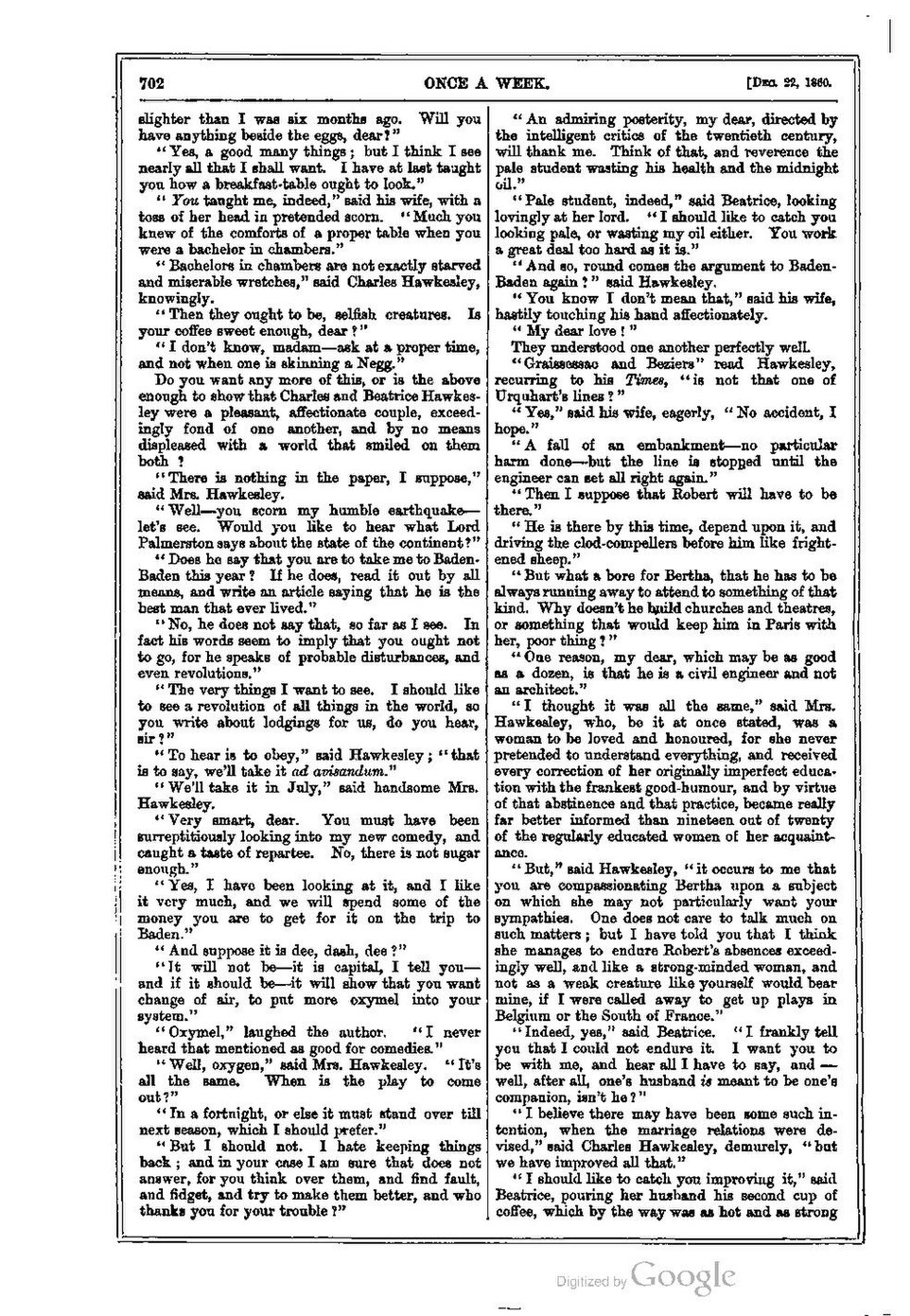slighter than I was six months ago. Will you have anything beside the eggs, dear?”
“Yes, a good many things; but I think I see nearly all that I shall want. I have at last taught you how a breakfast-table ought to look.”
“You taught me, indeed,” said his wife, with a toss of her head in pretended scorn. “Much you knew of the comforts of a proper table when you were a bachelor in chambers.”
“Bachelors in chambers are not exactly starved and miserable wretches,” said Charles Hawkesley, knowingly.
“Then they ought to be, selfish creatures. Is your coffee sweet enough, dear?”
“I don’t know, madam—ask at a proper time, and not when one is skinning a Negg.”
Do you want any more of this, or is the above enough to show that Charles and Beatrice Hawkesley were a pleasant, affectionate couple, exceedingly fond of one another, and by no means displeased with a world that smiled on them both?
“There is nothing in the paper, I suppose,” said Mrs. Hawkesley.
“Well—you scorn my humble earthquake—let’s see. Would you like to hear what Lord Palmerston says about the state of the continent?”
“Does he say that you are to take me to Baden-Baden this year? If he does, read it out by all means, and write an article saying that he is the best man that ever lived.”
“No, he does not say that, so far as I see. In fact his words seem to imply that you ought not to go, for he speaks of probable disturbances, and even revolutions.”
“The very things I want to see. I should like to see a revolution of all things in the world, so you write about lodgings for us, do you hear, sir?”
“To hear is to obey,” said Hawkesley; “that is to say, we’ll take it ad avisandum.”
“We’ll take it in July,” said handsome Mrs. Hawkesley.
“Very smart, dear. You must have been surreptitiously looking into my new comedy, and caught a taste of repartee. No, there is not sugar enough.”
“Yes, I have been looking at it, and I like it very much, and we will spend some of the money you are to get for it on the trip to Baden.”
“And suppose it is dee, dash, dee?”
“It will not be—it is capital, I tell you—and if it should be—it will show that you want change of air, to put more oxymel into your system.”
“Oxymel,” laughed the author. “I never heard that mentioned as good for comedies.”
“Well, oxygen,” said Mrs. Hawkesley. “It’s all the same. When is the play to come out?”
“In a fortnight, or else it must stand over till next season, which I should prefer.”
“But I should not. I hate keeping things back; and in your case I am sure that does not answer, for you think over them, and find fault, and fidget, and try to make them better, and who thanks you for your trouble?”
“An admiring posterity, my dear, directed by the intelligent critics of the twentieth century, will thank me. Think of that, and reverence the pale student wasting his health and the midnight oil.”
“Pale student, indeed,” said Beatrice, looking lovingly at her lord. “I should like to catch you looking pale, or wasting my oil either. You work a great deal too hard as it is.”
“And so, round comes the argument to Baden-Baden again?” said Hawkesley.
“You know I don’t mean that,” said his wife, hastily touching his hand affectionately.
“My dear love!”
They understood one another perfectly well.
“Graissessac and Beziers” read Hawkesley, recurring to his Times, “is not that one of Urquhart’s lines?”
“Yes,” said his wife, eagerly, “No accident, I hope.”
“A fall of an embankment—no particular harm done—but the line is stopped until the engineer can set all right again.”
“Then I suppose that Robert will have to be there.”
“He is there by this time, depend upon it, and driving the clod-compellers before him like frightened sheep.”
“But what a bore for Bertha, that he has to be always running away to attend to something of that kind. Why doesn’t he build churches and theatres, or something that would keep him in Paris with her, poor thing?”
“One reason, my dear, which may be as good as a dozen, is that he is a civil engineer and not an architect.”
“I thought it was all the same,” said Mrs. Hawkesley, who, be it at once stated, was a woman to be loved and honoured, for she never pretended to understand everything, and received every correction of her originally imperfect education with the frankest good-humour, and by virtue of that abstinence and that practice, became really far better informed than nineteen out of twenty of the regularly educated women of her acquaintance.
“But,” said Hawkesley, “it occurs to me that you are compassionating Bertha upon a subject on which she may not particularly want your sympathies. One does not care to talk much on such matters; but I have told you that I think she manages to endure Robert’s absences exceedingly well, and like a strong-minded woman, and not as a weak creature like yourself would bear mine, if I were called away to get up plays in Belgium or the South of France.”
“Indeed, yes,” said Beatrice. “I frankly tell you that I could not endure it. I want you to be with me, and hear all I have to say, and—well, after all, one’s husband is meant to be one’s companion, isn’t he?”
“I believe there may have been some such intention, when the marriage relations were devised,” said Charles Hawkesley, demurely, “but we have improved all that.”
“I should like to catch you improving it,” said Beatrice, pouring her husband his second cup coffee, which by the way was as hot and as strong